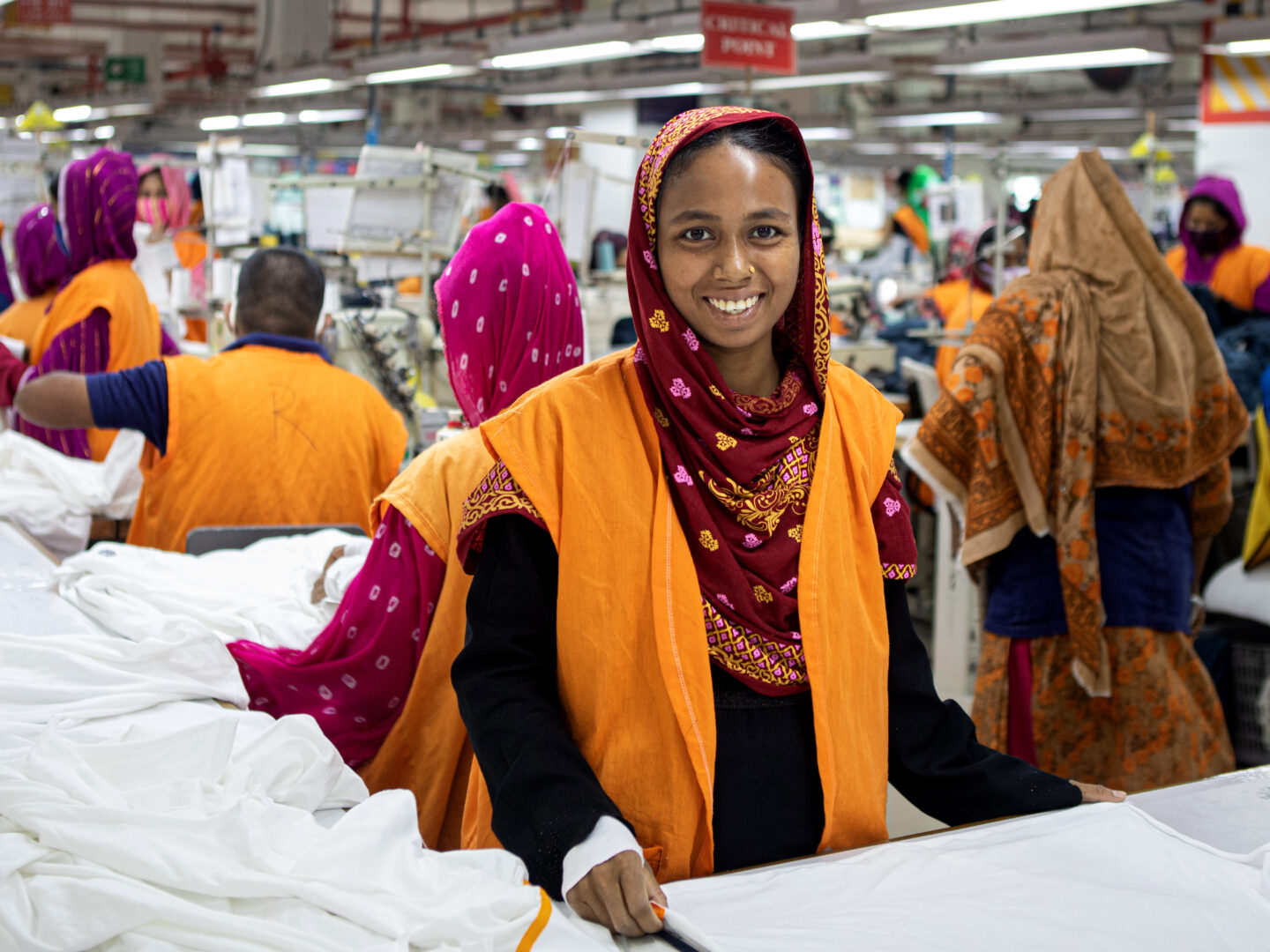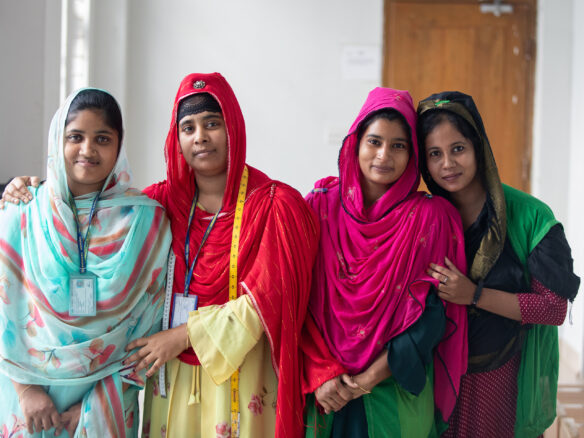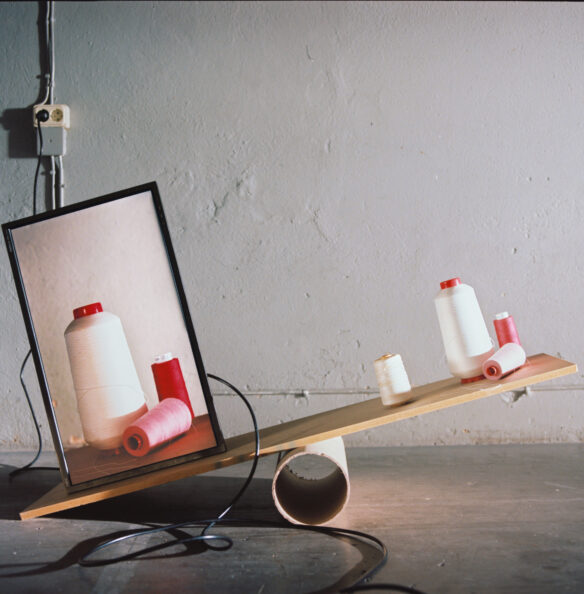The textile industry is undergoing a fundamental transformation where the use of automation and digital technology is making its way into the industry. The next decades will bring more innovation and robotics into the industry, demanding a different setup of skills, technology, and workforce. The new tech will have a significant impact on the current and future labour market, as it has the potential to create new job opportunities and increase the competitiveness of the Bangladeshi ready-made-garment (RMG) industry, while simultaneously threatening millions of jobs. Women are particularly at risk, as they represent the majority of the workforce within the RMG industry and are often employed to execute tasks which are highly affected by automation.
Multiple challenges to address and support
Over the past years, we have seen progress where social sustainability has become a more integral part of how businesses work today. However, the RMG industry in Bangladesh still has several challenges to address.
As a philanthropic foundation, H&M Foundation finds, funds and facilitates disruptive innovations, initiatives and research. Our mission is to enable an inclusive and planet positive textile industry, and we use our unique role to identify gaps and opportunities in the textile industry and bring people and innovation together. We are committed to support the Bangladeshi RMG industry’s future evolution with the aim to prepare the women garment workers for a future defined by automation.
A holistic systems change approach
To prevent the women from being pushed out of the industry, they need to be prepared for a future where they can work successfully alongside automation and AI. This future work requires not only the right preconditions at the workplace but on a household and community level as well. If the women are to participate in up and reskilling initiatives to be part of the future labour force, other challenges in their lives also need to be addressed, such as access to subsistence, security, health or childcare.
This demands a holistic approach to the challenges, collaboration between diverse stakeholders towards the same goals and a collective understanding of who is living in poverty, how that poverty is experienced and the underlying causes. Governments, non-governmental organisations and philanthropic organisations working with these women need to have a multidimensional view of poverty which implies that poverty not only means lack of material resources, but also lack of power and voice as well as lack of opportunities and choice.
Fundamentally changing the system requires a systems change approach. Systems change is about addressing the root causes of social problems, which are often difficult and embedded in networks of cause and effect. To achieve this, current power relations need to be shifted and policies, practices, and resource flows need to address the underlying factors rather than the symptoms. Marginal improvements in just some areas won’t change the root of a problem. However, no actor can solve these challenges alone. Systems change requires that all actors play their part, and here we as a foundation have a unique role to play by being a non-profit and utilising philanthropy to create change. We have the fortunate opportunity to fund long-term social initiatives with a holistic mindset and try new methods and solutions, that could be too risky for for-profit actors.
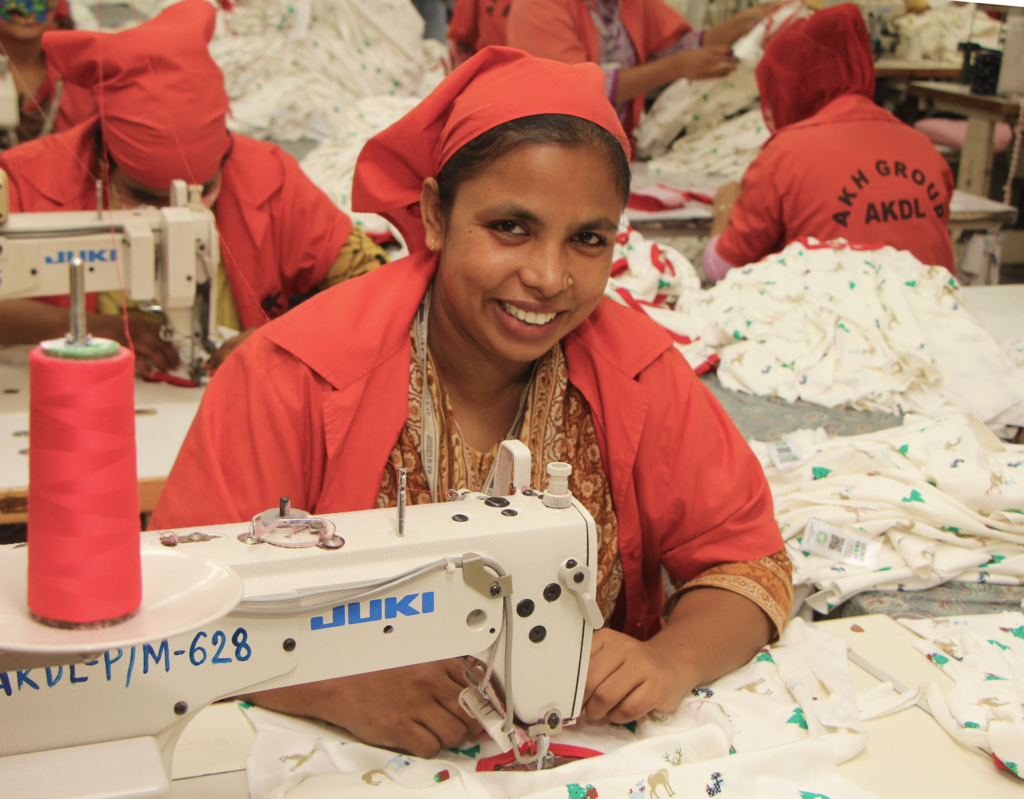
Oporajita – undefeated
With all this in mind, H&M Foundation has initiated and funds Oporajita – a USD 9,4 million collective impact initiative equipping women garment workers for the future in Bangladesh. Oporajita brings together a diversified group of stakeholders which are working collectively to ensure that women garment workers have access to the relevant working skills and competences needed for their future of work, while operating in an environment that is enabling and inclusive of their opinions and choices. Together with our partners we are catalysing women career progression to make the transition towards a circular fashion and textile industry just, fair, and inclusive. The activities within the initiative are designed, implemented, and evaluated together with the women garment workers themselves. Our collective impact initiative provides access to clean water facilities, hygiene practices and health services, gender-sensitive digital financial literacy as well as promoting gender-inclusive practices. And at community and household level, we are providing parenting support and childcare, as well as education to their children, with a special focus on girls´ STEM (science, technology, engineering, and mathematics) education.
“I have never run a tablet, and I have never used a touch phone,” is a common answer among the sewing operators in the RMG industry. Society’s perceptions such as “a woman’s income is only a backup, not a family’s main income” or “women are homemakers and should stay at home” disrupt women’s career development just as much as lack of adequate education.
This initiative aims to confront and challenge stereotypes and misconceptions around what women are capable of. Especially when it comes to women and high technology, entrepreneurship, and leadership positions. Women enter the garment industry with a target, planning to exit when the family is economically stable, when they’ve earned enough to build a house, when their children are grown, or when they’ve saved enough money. Men, on the other hand, plan to continue working in the industry and aim for career development. Inside the factory, women workers hardly see any women working as supervisors or in senior positions, so it doesn’t occur to them to become supervisors. It’s very difficult to be what you can’t see and that is why women roles models in leading positions are crucial.
Therefore, our partners within Oporajita identify knowledge gaps, cultural beliefs, and behavioural patterns that may act as barriers or provide opportunities to positively influence the broader community regarding women’s role in the workplace. We do this through social media campaigns, talk shows and radio drama. At household level we provide trainings with couples on marital communication, gender roles and decision-making; as well as creating women, couple, and family-friendly spaces to address gender-based violence.



Beyond this, we are establishing a mentor network of women leaders at garment factories to inspire potential women workers to pursue managerial and supervisory roles. Gender-based discrimination and harassment at the workplaces are tackled through gender-responsive human-resource management developed via our Gender Equality and Social Inclusion Assessment Toolkit. With this, the management, supervisors and the Worker Protection Committees, Anti-Harassment Committees and trade unions are provided training on gender discrimination and gender roles.
In addition to providing capacity training such as soft skilling (i.e. leadership skills, teamwork, time and conflict management) and technical skilling (i.e. how to handle high technology), we are putting effort on the full spectrum of the women’s physical, social, emotional, behavioural, and personal journeys.
In parallel, Oporajita collectively pushes boundaries through innovation. We run an innovation challenge, with the aim to fund gender-sensitive pilots that increase the competitiveness of the Bangladesh RMG sector while simultaneously increasing the employability of women workers. Women entrepreneurs are provided bootcamps with incubation support, and we arrange conferences in which diverse RMG stakeholders meet and decide on inter-linkages and collaborative actions.
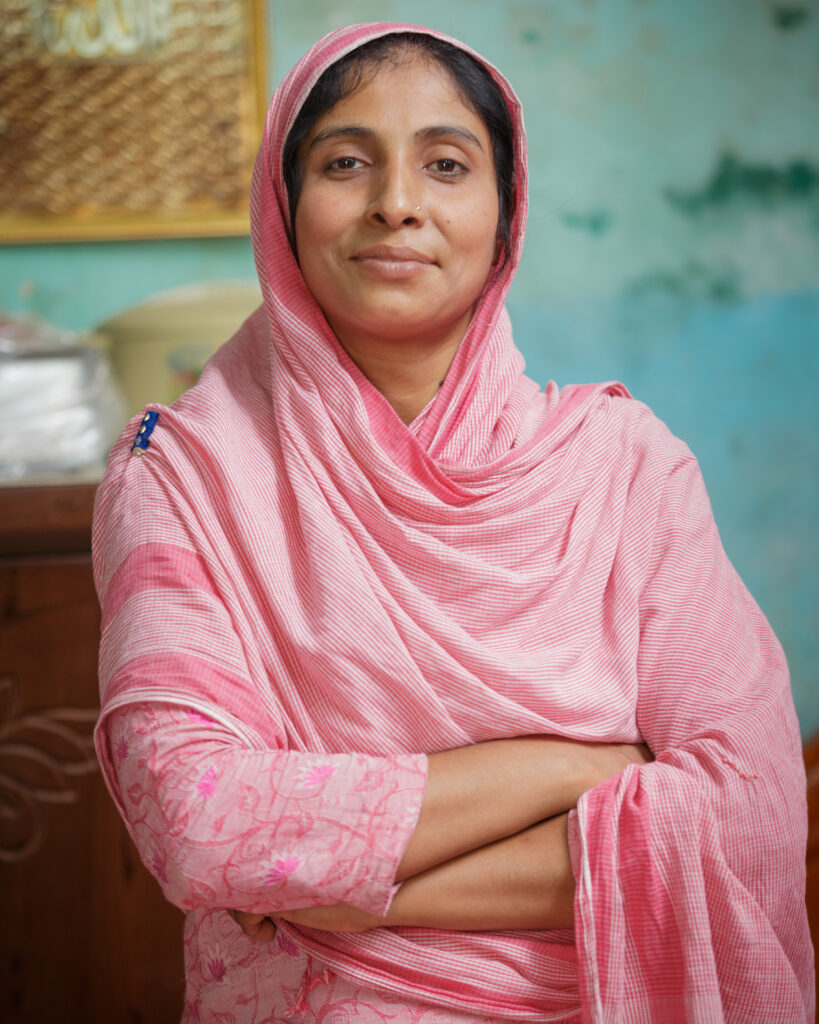
The time is now
As Bangladesh is making its way into the fourth industrial revolution, this could be a unique time for the women working in the garment industry to play a central role in bringing about the transformation the sector needs. When women thrive, whole communities and countries thrive. But economic resilience is not possible until she can make her own decisions about her life and future. By working collectively, we can holistically address challenges to women’s future employment opportunities – and achieve transformative change for the industry and the people working within it. The time is now.
Specifics – Oporajita
- Financial Support: 98,000,000 SEK (9,4 million USD)
- Period: 2022 — 2024
- Countries: Bangladesh
- Focus Areas: Inclusive Societies
- Partners: CARE Bangladesh, Center for Communication Action Bangladesh (C-Cab), Circular Apparel Innovation Factory (CAIF), FSG Inc, International Development Enterprises (iDE), LightCastle Partners, Save the Children Bangladesh, Shimmy Technologies, Sweden, Swisscontact, The Asia Foundation, United Nations Capital Development Fund (UNCDF), WaterAid Bangladesh and ygap
